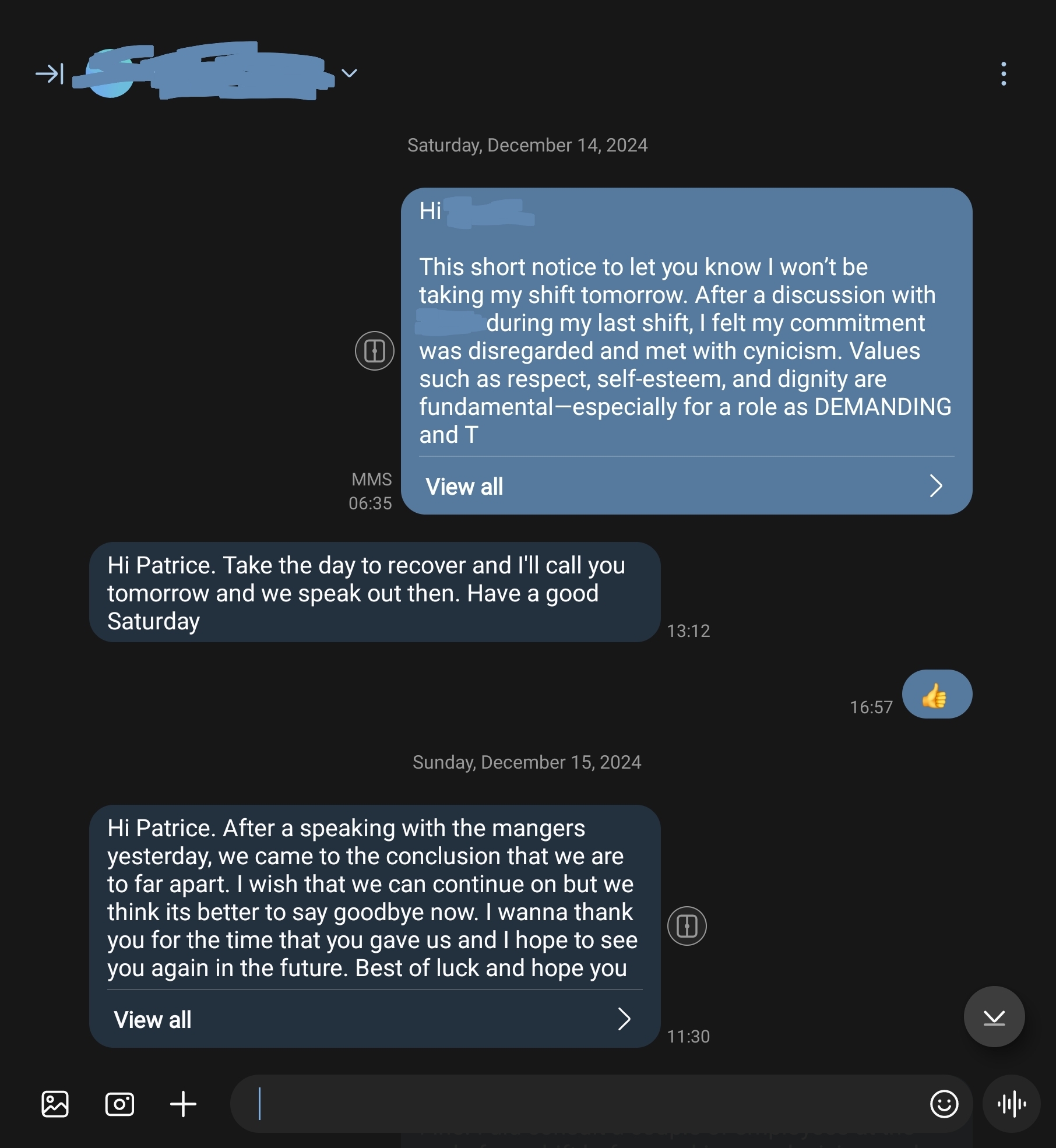On Dismissal by SMS
Published: May 3, 2025
Event date: December 14, 2024
Last updated: May 6, 2025
Type of article: Structured factual report
Tags: labor law, restaurant, Sweden, SMS
Structural Format: Circumstantial Exposition Model
This article adopts what is commonly referred to as a Circumstantial Exposition Model: a hybrid structure designed to document real-life incidents with both narrative clarity and legal coherence.
It combines chronological narration, factual anchoring, and interpretive layers to support legal, journalistic, or institutional assessments.
In legal writing, this structure appears as a case brief or factual memorandum.
In investigative journalism, it is reflected in timeline-driven exposés.
In academic research, the format resembles case-centered reflections.
In HR or compliance contexts, it parallels whistleblower reports.
The core objective is to track events as they unfold, qualify breaches, and assess consequences — without fictionalising or speculating. It supports both evidentiary scrutiny and systemic analysis.
This model combines chronological narration and factual anchoring with interpretive layers — offering a method suited for documenting workplace disputes or legal infractions without dramatization.
In this article, the chosen perspective is first-person: all facts are narrated by the individual directly affected, and grounded in verifiable documentation. This supports both legal coherence and narrative legitimacy.
Article Structure (5-step internal guide)
- Contextual background – where, when, under what conditions
- Chronological unfolding – facts laid out with timestamps
- Qualification of the breach – what makes it problematic or unlawful
- Reactions and consequences – both immediate and downstream
- Comparative societal reflection – contrasting legal expectations in Sweden vs. the US
At 6:35 AM on December 14, 2024, after a work shift that ended slightly earlier than usual, I sent a message to management proposing to take a short break. The message included an additional note: if the proposal was not accepted, they could interpret the text as a resignation.
Several hours later, a manager acknowledged receipt and said the matter would be discussed. No follow-up occurred during the day.
On the following day, December 15, at 11:30 AM, I was notified by SMS that the management had decided to “part ways.” This article reconstructs the events, documents the exchanges, and examines the legal and procedural implications of the termination.
Disclaimer: For confidentiality purposes, certain names (e.g., “Mina”, “Erik”) have been altered. The chronology and content remain accurate and based on verifiable events.

Screenshot of the actual dismissal SMS (names blurred)
In December 2024, I was employed as a dishwasher at Quan, a restaurant located inside the Elite Hotel Esplanade in Malmö. Although I had no written contract, I worked regular late-night shifts, typically finishing between 4:30 and 5:30 AM, with occasional earlier or longer closings.
I had no direct contact with the hotel’s administration. My only supervisor was a woman named Mina, who acted as manager on-site. She gave instructions, managed schedules, and appeared to oversee daily operations, though her exact formal title or role within the company was never disclosed.
From November 23 to December 15, 2024, I worked as a dishwasher in a restaurant located inside a luxury hotel in Malmö, known for being fully booked several weeks in advance. The onboarding was informal: no written contract, no introduction to rules or expectations, and no outline of duties. The work relied on informal verbal cues and implicit norms.
There was no team-wide communication channel, aside from the shared schedule system (Personalkollen). Instructions came mainly from Emil, a manager operating mostly via SMS. Floor-level authority, however, seemed to rest with Mina, whose role was never explicitly defined, yet who visibly directed staff on site. I was never formally introduced to her or briefed on her function.
On December 14, I made several verbal attempts to clarify my role, especially regarding a test period where I was unofficially expected to replace the external cleaning team. Over the span of a few hours, I addressed Mina multiple times, asking for a short exchange. My requests were either ignored, deflected ("go speak to Magnus"), or met with ironic laughter.
In one instance, she walked away laughing with a colleague after I asked a basic question. Another time, she responded with a dismissive look. Only once—when noticing my visible disappointment—did she give a brief answer in front of another staff member. By the end of the shift, I was physically strained from repeated hand injuries and carrying a significant sleep debt, and mentally affected by the persistent lack of recognition and clarity.
That evening, I attempted several times to speak with Mina, seeking clarity on my duties — especially regarding the trial replacement of the external Friday cleaning service. She reminded me I was still on a trial period and said it wasn’t the right time. I acknowledged this and backed off initially.
Later, when the environment seemed calmer, I tried again. I had become more familiar with the team and the place, and I felt increasingly confident initiating that kind of exchange. But she either avoided me, dismissed the request, or responded with sarcasm. One interaction even ended with a smirk and her walking away mid-sentence.
Despite these attempts, Mina had earlier encouraged me to take on extra duties, and the head chef had said he might make me the “main guy.” Still, I received no clear instructions. Erik, the other manager visible in media, remained silent. He never introduced himself formally nor spoke about work. The two managers seemed to operate independently and barely acknowledged each other. I found myself isolated and uncertain who to approach.